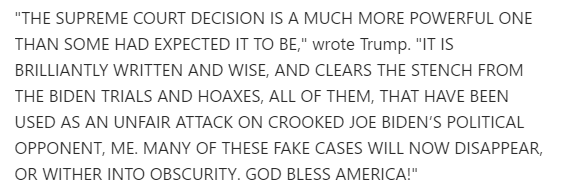
🏅 Top traders
| # | Name | Total profit |
|---|---|---|
| 1 | Ṁ25,330 | |
| 2 | Ṁ10,005 | |
| 3 | Ṁ8,841 | |
| 4 | Ṁ8,817 | |
| 5 | Ṁ8,245 |
People are also trading
Preface: I didn't bet on the resolved option or on "6-3 against Trump", so either way (with this resolution or with my preferred resolution) I would've lost my investment.
That said, I believe this resolution is incorrect. To characterize the SCOTUS decision as unambiguous "in Trump's favor" is a woeful misreading and oversimplification. At best (for Trump) this is half in his favor and half against (should've resolved 50% to both of the 6-3 options).
Little bit of an elaboration: the decision held that presidents enjoy absolute immunity for some actions, a presumption of immunity for other actions, and no immunity for other actions. It it literally not at all what Trump argued (absolute immunity for any and all actions), so to characterize it as "in Trump's favor" is simply incorrect.
That said, I can see a world in which "in Trump's favor" refers to a decision Trump likes, rather than a decision that is objectively in agreement with what Trump argued in court - if so though, your description should've said so because I'd assume a priori that you were using a more objective measure. With those in mind, I'd improve my assessment of this resolution from 1/5 stars to ~2.5/5 stars. Still not great, but not necessarily crazy.
> It it literally not at all what Trump argued (absolute immunity for any and all actions)
my understanding is that they practically never give either side 100% of what they argued for, and the lawyers go into it knowing that and ask for more than would be reasonable for them to receive in order to use anchoring bias to their advantage. I think you are the third person I've seen arguing that since he didn't get everything he asked for it wasn't in his favor which seems like a misunderstanding of how the system works to me. you also seem to be arguing that the 6 conservative judges all ruled against trump and the 3 liberal judges all ruled for trump, which seems very unlikely.
I resolved based on overwhelming consensus of the media, lawyers, and my own personal reading of the opinion, but hopefully Trump's statement can make this relatively obvious to people who don't have the time to look into it. I don't think it's particularly likely that e.g. Trump would lie about his reading of the case, given his eagerness to criticize anyone and anything that he doesn't like, including SCOTUS decisions.
At the end of the day, it is very difficult to make markets for a SCOTUS case when we do not know in advance on what lines they will hold and write criteria for all possible situations. I believe that this is by far the best resolution of the ones available and that the vast majority of people would choose the same given the available information. The decision effectively accomplished everything Trump wanted out of the legal action, even though they didn't agree with every single one of the oral arguments his lawyers made (I wonder how often that happens for either party?)
@SemioticRivalry So, just to be clear for future markets: Hypothetically, if this opinion had come out with the exact same majority opinion and with 3 dissenting justices instead opining that Trump should have absolute immunity from all prosecution, then would this market have still resolved the same way, as 6-3 in Trump's favor?
my understanding is that they practically never give either side 100% of what they argued for, and the lawyers go into it knowing that and ask for more than would be reasonable for them to receive in order to use anchoring bias to their advantage
I'm aware of this, and my judgment on this resolution isn't entirely based on this aspect - I was merely pointing it out.
My judgement is based on what I believe to be a clear and correct understanding of what this decision actually did. I don't think "the overwhelming consensus of the media" is at all valuable when talking about SCOTUS - most reporting on the court's decisions is garbage.
The majority opinion threw out a single one of the charges against Trump at issue. A single one. The rest they remanded back down to lower courts, with instructions to sort them into the three buckets I mentioned (core presidential powers with absolute immunity, powers at the periphery of the presidency with a presumption of immunity but not absolute, and non-official acts with no immunity). When this eventually comes back up, some of Trump's acts will be prosecutable and others won't. That's not a win for Trump.
It is true that this decision is a win in the sense that it delays the prosecution until after the election, but that was always going to be the case - it isn't specific to this decision.
I stand by my opinion on this resolution. As previously mentioned, I have no financial stake in it - I just don't think it's an accurate summary of the court's decision (media hyperventilating aside).
I agree it's not perfectly correlated but when one party says it's great and the other party says it's terrible, most people would agree that this is fairly strong evidence that the first party won in most cases. Combining that with the overwhelming media and legal consensus (I havent seen a single lawyer willing to say trump lost this case?) means I don't think there's a reasonable alternative resolution
I haven't seen a single lawyer willing to say Trump legally won the case. The most I can find is people saying it will delay the trial, but that would have been true with almost any result and is arguably bad for Trump in this specific case. Now, his actions are all going to get more directly litigated to determine if they were "official" or not, putting them even more-so in the spotlight right before the election.
Really, there's almost nothing in this opinion that's legally helpful to Trump other than that if an act is determined to have immunity based on a later lower court ruling, then it can't be used as evidence at trial related to other acts. Even that ruling was only 5-4 though; Barrett didn't concur with that part.
@SemioticRivalry I think your reasoning is a valid interpretation of the plain meaning of your question title. I don't personally think it's the most correct/general interpretation (which is why I still disagree with the question resolution), but I am certainly not accusing you of acting in bad faith or anything like that.
Why do I still call it an incorrect resolution if I think your interpretation is valid? I think for me, this goes to my philosophy for question interpretation and resolution. In my personal opinion, any ambiguity in question resolution criteria is on the question creator to resolve in the description for the question. Creators who do not do so accept the possibility for potentially having people bet on their questions who have different interpretations, and (if those alternate interpretations are also reasonable) the responsibility for resolving incorrectly (for those people) in such a case - which of course in addition to harming those people, hurts the accuracy of the question and Manifold in general.
There's also a caveat emptor element here, of course. Bettors should be cautious of betting on questions that do not have clear resolution criteria in the description. I think Manifold would be overall a better site if people refused to bet on questions without clear resolution criteria.
Hopefully that helps clarify my position a bit. Cheers!
I can't wait for this to go to a lower court, for them to rule that basically all of the acts are unofficial, and then for this to end up back in front of the Supreme Court so they have to reconsider their own decision regarding the same case.
Law students will despise learning this case law for decades, and the next time a President does something even slightly questionable the legal response will be pages of such confusing jargon that everyone will just assume the President must be in very deep legal trouble.
